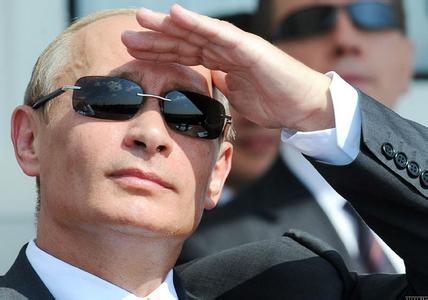普京的盗贼统治

普京的盗贼统治
Now in his third (nonconsecutive) presidential term, Vladimir Putin presents himself as the strong and virtuous leader who rescued Russia from the chaos, corruption, penury and weakness of the 1990s.
弗拉迪米尔·普京(Vladimir Putin)在其第三任(非连续)总统任期上,将自己打造为一个强大而善良的领袖,将俄罗斯从20世纪90年代以来的混乱、腐败、赤贫和积弱中拯救出来。
State-controlled news media and Kremlin spin doctors disseminate this message diligently — and to good effect, judging from Putin’s 80 percent approval rating. But with “Putin’s Kleptocracy,” Karen Dawisha, a respected scholar of Soviet and Russian politics at Miami University in Ohio, seeks to shred this carefully constructed narrative.
政府控制下的新闻媒体与克里姆林宫的媒体顾问们孜孜不倦地散播这个信息,收到了良好的成效——普京的支持率高达80%。但是俄亥俄州迈阿密大学著名苏联与俄国政治学者凯伦·达维沙(Karen Dawisha)在她的《普京的盗贼统治》(Putin’s Kleptocracy)一书中,试图打破这种精心建构的说法。
Her verdict is not merely that Putin’s boast of having built a potent, efficient state that fights for the little guy and against the venality of the powerful is bunk. Her bedrock claims are that the essential character of Putin’s system is colossal corruption and that he is a prime beneficiary. The thievery, she says, has made him fabulously rich, along with a coterie of trusted friends dating back to his days as a K.G.B. officer in Communist East Germany, then as first deputy mayor in 1990s St. Petersburg, then as head of the Federal Security Service.
普京声称,自己已经建立起一个强大而高效的国家,它为普通人而奋斗,反对权力腐败,这本书并不仅仅主张普京的夸口是空话,它的基本观点是:普京体系的最基本特点正是大规模的腐败,而普京就是最主要的受益人。本书认为,窃国令普京暴富,还有他在共产主义东德期间担任克格勃官员、90年代在圣彼得堡担任第一副市长和联邦安全委员会主席期间结识的密友小圈子也跟着发了财。
In explaining the system’s workings, Dawisha enumerates the standard shenanigans of crooked regimes: bribetaking from domestic and foreign companies seeking business permits; kickbacks from inflated no-bid contracts for state projects; privatization deals rigged to enrich cronies who will later be cash cows for the Kremlin; illicit exports of raw materials purchased at state-subsidized prices and sold for a killing; “donations” from oligarchs eager to keep feeding at the government’s trough; real estate scams yielding mega-profits and palatial homes; money laundering; election-fixing; labyrinthine offshore accounts; lucrative partnerships with the mob; and the intimidation, even elimination, of would-be whistle-blowers.
为了解释这一系统如何运作,达维沙列举了贪赃枉法的政权的种种标准诡计:向谋求商业许可的国内外公司收取贿赂;从国有项目夸大的非投标合同中收取回扣;非法操纵私有化合同,令普京的好友致富,而这些朋友日后亦为克里姆林宫提供大量现金;非法出口以政府津贴价格购买的原材料,并以低价出售;接受来自渴望继续从政府获利的寡头政治家的“捐赠”;房地产骗局令少数人暴富,建起宫殿般的房屋;洗钱;操纵选举;扑朔迷离的离岸账户;与黑帮有利可图的合作伙伴关系;恫吓甚至消灭可能出现的举报者。
To prosper, Russia’s superrich must demonstrate absolute loyalty to the president. As Mikhail Khodorkovsky and other tycoons have discovered, the punishment for defiance is severe.
为了不断繁荣发展,俄罗斯的巨富们必须对总统绝对忠诚。如米哈伊尔·霍多尔科夫斯基(Mikhail Khodorkovsky)和其他若干大亨们的遭遇所示,如果试图反抗,就会遭受严厉的惩罚。
Dawisha won’t disappoint readers seeking examples of industrial-size sleaze. She reckons Putin’s private wealth at $40 billion and lists among his prized possessions yachts, planes and palaces — along with a $700,000 wristwatch collection for good measure. As for the Friends of Vladimir, Dawisha writes that “more than half of the $50 billion spent on the Sochi Olympics simply disappeared into the pockets of Putin’s cronies.” The Rotenberg brothers, Putin’s childhood chums, alone garnered $2.5 billion of the outlay for the games.
达维沙找到许多大规模的污秽丑闻,定然不会让读者失望。她估算,普京的私人财富约在400亿美元左右,并列举了他昂贵的私人游艇、飞机和豪宅,此外还有价值70万美元的腕表收藏。至于弗拉迪米尔的朋友们,达维沙写道:“索科冬奥会花费的500亿美元中,约有一半来自普京密友们的口袋。”仅仅普京的儿时密友罗登伯格(Rotenberg)兄弟就为奥运会掏了25亿美元。
Russia’s roster of 110 billionaires remains remarkably static, even as the wealthy in other countries rise and fall. What these plutocrats share are longstanding, close connections to Putin. And not a few are former K.G.B. operatives themselves.
不管其他国家的富人如何沉浮起落,俄罗斯的亿万富翁名单相对保持着稳定。他们的共同之处是,都与普京保持着长期密切的关系,其中有不少人本身就是克格勃的前特工。
Dawisha’s charges are not entirely new: Her copiously researched account relies on books, news reports, official documents, memoirs, WikiLeaks and witness testimonies collected by Russian and foreign journalists. The torrent of detail, some of it well known and peripheral to her kleptocracy theme, can drown readers who are untutored in Soviet and Russian politics. Still, “Putin’s Kleptocracy” is the most persuasive account we have of corruption in contemporary Russia. Dawisha won’t be getting a Russian visa anytime soon. Her indictment — even if it wouldn’t stand up in a court of law — hits Putin where it really hurts.
达维沙的指控并不完全新鲜:为创作此书,她大量研究了各种书籍、新闻报道、官方文件、回忆录、维基解密资料,以及俄罗斯国内外记者收集的证词。诸多细节之中,有些是广为人知的,而且对她的“盗贼统治”主题而言比较次要,这些会令不熟悉苏联与俄罗斯政治的读者感到头昏脑涨。不过《普京的盗贼统治》仍然堪称关于当前俄罗斯腐败状况的最有说服力的描述。达维沙近期内不可能得到俄罗斯签证了。她的控诉尽管不是在法庭上进行,但真正击到了普京的痛处。
He may cop to being an authoritarian (he boasts of building a strong state), a nationalist (he wears a cross, preaches patriotism and praises the Orthodox Church) and an empire builder (he brags about retaking Crimea and is unapologetic about seeking a sphere of influence). But the accusation that he’s a common crook, or even an uncommon one, is different — and a charge he doesn’t treat lightly. That’s why Russian reporters avoid it, especially as political controls have tightened, and why Dawisha’s original publisher, Cambridge University Press, declined to print the book on the advice of its lawyers worried about the possibility of legal action.
他或许承认自己是个独裁者(他夸口说自己建造了一个强大的国家)、一个民族主义者(他戴十字架、鼓吹爱国主义、赞美东正教),乃至一个帝国的缔造者(他夸口说自己收回了克里米亚地区,毫不心虚地谋求扩大势力范围)。但这本书指控他就是个骗子,甚至是个非同寻常的骗子,这就完全不一样了,这个指责是他无法轻视的。正因如此,俄罗斯的记者们都回避这个指控,特别是当前的政治控制已经收紧;正因如此,达维沙原先的出版者,剑桥大学出版社拒绝出版这本书,因为律师担心它有可能为他们招来法律诉讼。


















